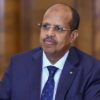WASHINGTON, November 5 – Barack Obama tore down barriers of race, logic and probability in his epic quest for the presidency, along the way remaking the electoral map and redefining the way American elections are fought.
The 47-year-old senator from Illinois set out two years ago to purge what he saw as the smallness of modern US politics, the fierce partisanship and deliberate division that have soured at least the last two term presidencies.
Many observers thought the first-term senator was making a mistake by running when he did, but he saw what few others did — that America was ready for his brand of transformation leadership.
Obama settled on the mantra of "Change," which gelled perfectly with a time when polls showed more than 80 percent of Americans thought their country was heading down the wrong track and President George W. Bush was wildly unpopular.
That message stayed consistent throughout the long two-year campaign, and weathered the political earthquake spawned by the worst financial crisis since the 1930s.
During the spellbinding 2008 race which ended with him becoming the first black US president, Obama wobbled several times, but went further in forging his coalition than many analysts expected, in a victory of near landslide proportions over Republican John McCain.
"He has reinvented politics from the way it has been at least since 1972," said Paul Levinson, a political scientist at Fordham University, New York.
"This is as profound a revolution as Franklin D. Roosevelt’s election in 1932 and John F. Kennedy’s in 1960," he said.
Obama’s emphatic victory made him the first Democrat since Jimmy Carter, also a Democrat, to get more than 50 percent of the popular vote in 1976.
It was achieved by tying his change message, with a formidable grass roots movement, and success in portraying McCain as offering only four more years of Bush’s Republican policies.
His huge win was not the thread-the-needle win that Bush won in 2000 and 2004, which critics said were forged by deliberately sowing division and setting communities against one another.
"We were able to overcome a lot of the things that a lot of people thought were insuperable barriers in our politics," Obama’s top strategist David Axelrod said on MSNBC.
"We put together a national coalition … that is what we set out to do and that is what we did."
It was the mastery of his campaign manager David Plouffe who plotted Obama’s route, first through the tense Democratic primary campaign against Hillary Clinton by dismantling the party’s preeminent political machine in the process.
He then built Obama multiple routes to the presidency in the general election, in a bid to avoid the nailbiting and ultimately futile waits for victory in Florida and Ohio that Democrats Al Gore and John Kerry endured in 2000 and 2004 respectively.
One question the Clinton campaign often leveled at Obama was whether he would be able to weather the fierce potency of the "Republican attack machine."
During a bracing general election campaign, Obama had to fight off controversies about the racial rhetoric of his former pastor Jeremiah Wright, and his past associations.
He was accused of not sharing core American values, beat off Internet smear campaigns that accused him of being a closet Muslim, and faced claims by McCain that he was woefully unprepared to be commander in chief.
Republican vice presidential nominee Sarah Palin accused him of "palling around with terrorists," a reference to his past friendship with 1960s radical William Ayers.
But in the heat of the economic crisis, the fierce character assaults which had harmed the last two US presidents did not hit home.
Would they have worked had the US economy not pitched into crisis?
Dan Shea, a political scientist at Allegheny College, Pennsylvania said probably not.
"I don’t think Obama needed the economic crash to pull this off," he said.
"When you have 80 percent country heading into the wrong direction, you have got presidential popularity below 30 percent … boy oh boy, the party in power is going to pay a price."














































